What does you ni ように mean in Japanese?
Most likely, it means something "will become," naru なる, in a way that does X, i.e. it will start doing X; it may also mean to stop doing X by becoming in a way that doesn't do X; it may mean "to make Y become," suru する, in a way that does or doesn't do X; to ensure X happens; to do Y so that X happens; at the end of sentences it may be a prayer wishing that X would happen; it may also mean to do or be X "like" one were Y, in similar way; or to do X like Y were true, as if. Syntactically, this is you 様 followed by the ni に copula.
- Tarou ga {{hon wo yomu} you ni} natta
太郎が本を読むようになった
Tarou became {in such way [that] {reads books}}.
Tarou started reading books. - Tarou ga {{hon wo yomanai} you ni} natta
太郎が本を読まないようになった
Tarou became {in such way [that] {doesn't read books}}.
Tarou stopped reading books. - {{me-datanai} you ni} shita
目立たたないようにした
[I] made [it] {so [that] {[it] doesn't stand out}}.
[I] made [it] stop standing out.
[I] made [it] inconspicuous. - {{itsu demo nigerareru} you ni} junbi shite-oita
いつでも逃げられるように準備しておいた
{So that {[I] could escape anytime}}, [I] prepared in advance. (e.g. I prepared a escape route in advance.)
{To ensure {[I] could escape anytime}}, [I] prepared in advance. - {shukudai wo wasurenai} you ni ne
宿題を忘れないようにね
Ensure that {[you] don't forget [your] homework}, okay?
Make sure you do your homework, alright? - shiken ni ukarimasu you ni!
試験に受かりますように!
[Let it be that] [I] will pass the exam! (used when praying that one would pass some exam, e.g. to enter an university.) - {hane no you ni} karui
羽のように軽い
Light {like a feather would be}.
Light {like a feather}.
As light as a feather. - {marude katta ka no you ni} yorokonde-ita
まるで勝ったかのように喜んでいた
[He] was happy about [it] {in a way that was like if [he] had won}. (i.e. he lost a match, but he looked like he had won given how pleased he was with it.)
[He] was so happy about [it] [it] was as if [he] had won.
Manga: Chainsaw Man, チェンソーマン
Manga: Gabriel DropOut, ガヴリールドロップアウト
Manga: Historie, ヒストリエ
Manga: Ya Boy Kongming!, Paripi Koumei パリピ孔明
Manga: Sousou no Frieren, 葬送のフリーレン
Grammar
See the article about you 様 for details about the grammar. This article is only to list examples.
The phrase you da ようだ is the predicative form of you ni (you desu ようです is the polite form of you da), while you na ような is the attributive form.
As an adverb, you ni sometimes simply modifies predicates (adjectives and verbs, translating to "such that," "like"), while other times describes the cause or goal of some action ("so that").
The phrases ~you ni naru ~ようになる and ~you ni suru ~ようにする work the same way as ~ni naru, ~ku naru, ~ni suru, and ~ku suru: we have the ergative verb pair naru/suru, "to become," "to cause to become," and they require a stative predicate in adverbial form as subject/object complement.
- X ga Y ni/~ku naru
Subject X becomes subject complement Y.
e.g. Mary becomes happy. - X ga Y wo Z ni/~ku suru
Subject X causes object Y to become object complement Z.
e.g. John makes Mary happy.
Statives in nonpast form are normally not interpreted in future tense without an eventive verb like ~naru. Statives that are verbal (stative verbs, e.g. the potential form, and habitual predicates derived from eventive verbs) lack an adverbial form in Japanese. To make such statives future-tensed, ~you ni is used. In this case ~you ni does nothing but act as their de facto adverbial form (in some other cases it's a future-tensed "like").
- watashi wa tabako wo suu
私はタバコを吸う
I smoke cigars. (present habitual.)
I will smoke a cigar/some cigars. (future perfective.)
*I will some cigars. (wrong.) - watashi wa {{tabako wo suu} you ni} naru
私はタバコを吸うようになる
I will become {in such way that {smokes cigars}.
I will smoke cigars. (future habitual.)
I will start smoking cigars.- c.f. inu no you ni naru 犬のようになる, "to become like a dog."
Caveat: since suu has no adverbial form, you must use ~you ni, but its negative form, suwanai すわない, has the adverbial form suwanaku すわなく. Consequently, you have two ways to say the same thing: suwanai you ni naru 吸わないようになる and suwanaku naru 吸わなくなる. With naru there seems to be no difference, but with suru the phrase ~naku suru is used when the subject directly causes the negative change of state, while ~nai you ni suru is used when they indirectly cause it.(池上, 2002:1)
- Context: the characters are trapped.
- {hachi-kai kara derenaku} natte-iru...
8階から出れなくなっている・・・
[It] has become so that {[we] can't leave the eighth floor}.
[We] are no longer able to leave the eighth floor.- hachi-kai kara derenai - "[we] can't leave the eighth floor."
- derenaku - adverbial form of derenai 出れない, "can't leave," negative form of dereru 出れる, "to be able to leave," potential form (missing ra ら) of deru 出る, "to leave."
- ~kai - counter for floors.
- n... {{hachi-kai kara derareru} you ni} natta-n-desu ka?
ん・・・8階から出られるようになったんですか?
Hmm... did [it] become {so [that] {[we] can leave the eighth floor}}?
Hmm... can we leave the eighth floor now?- hachi-kai kara derareru - "[we] can leave the eighth floor."
- derareru - potential form (including ra ら) of deru 出る.
- zan'nen nagara mada muri-ppoi
残念ながらまだ無理っぽい
Unfortunately [it] seems to be still impossible.
Because statives in the adverbial form normally come before naru/suru, sometimes naru/suru is omitted as it's generally obvious to a Japanese native that that's what the sentence predicate would be.
Sentences that end in ~you ni thus are incomplete sentences lacking this predicate. Typically it would be suru, e.g. wasurenai you ni means wasurenai you ni shite-kudasai 忘れないようにしてください, "please make sure [you] don't forget." Exceptionally, in the prayer usage you ni works more like a sentence ending particle, considering the polite form can be used before it (~masu you ni ~ますように, ~masen you ni ~ませんように).
Examples
- Context: "platelets," kesshouban 血小板, drawn as cute anime girls, receive their marching orders.
- {{hagurenai} you ni} {katte na} koudou wa shinai koto!
はぐれないように勝手な行動はしないこと!
Do not [act on your own] {as {to not stray away}}!- katte
勝手
(refers to doing things without consulting others.) - hagureru
逸れる
To stray away [from a group]. To lose sight of [one's group].
- katte
- hai'!
はいっ!
Yes, [ma'am]! - hoka no ko to kenka shinai koto!
他の子とケンカしないこと!
Do not fight with other kids! - hai'!
はいっ!!
Yes, [ma'am]! - {jiipiiwanbii toka wo chanto tsukatte} {{tobasarenai} you ni} suru koto!
GPIbとかをちゃんと使って飛ばされないようにすること!
{Do use GPIb, etc. properly and} {ensure {[you don't get sent flying away]}}!- GPIb, Glycoprotein Ib, allow platelets to adhere at sites of injury.
- tobu
飛ぶ
To jump. To fly. - tobasu
飛ばす
To make [something] fly. (ergative verb pair.) - tabasareru
飛ばされる
To be made fly [by something]. (passive form.)
- Context: a boy wants to buy a book, but it's out of stock.
- nandeshitara hairi shidai otaku e otodoke itashimashou ka
何でしたら入り次第お宅へお届けいたしましょうか
[If you want] [I] will deliver [it] to [your] house [as soon as] [it] enters [stock].- shidai
次第
Depending on. In this case, when he delivers the book depends on when it enters stock. As soon as.
- shidai
- sou shite kureru?
そうしてくれる?
[You] will do so for [me]? - daikin wa {{sono ba de harau} you ni} shitoku kara
代金はその場で払うようにしとくから
As for the payment, [I] will make [it] {so [that] {[it] is paid there}}.
- i.e. the payment will be ready at his home for when it arrives.
- Context: a customer asks for a coffee blend, the owner of a coffee shop starts talking about his passion.
- jitsu wa watashi... burendo koohii niwa sukoshi jishin ga atte ne
実は私・・・ブレンドコーヒーには少し自身があってね
To tell the truth... I have a bit of confidence in [making] coffee blends, [you see].- X niwa Y ga aru - double subject construction.
- {aji ya kaori wo {yoku} suru} tame ni go-shurui no koohii-mame wo tsukatte-iru-n-da
味や香りを良くするために5種類のコーヒー豆を使っているんだ
In order {to make the taste and aroma {better}}, [I] use five types of coffee-beans.- yoku - adverbial form of yoi 良い, "good," synonymous with ii いい.
- kaori - noun form of kaoru 香る, "to smell."
- aji ya kaori ga ii
味や香りが良い
The taste and aroma are good.
- {{{sorezore no mochi-aji wo ikaseru} you ni} kufuu wo kasaneta} no ga touten no burendo de ne
それぞれの持ち味を生かせるように工夫を重ねたのが当店のブレンドでね
{Using multiple techniques so {to be able to bring out the flavor of each [bean]}} is this store's blend, [you see].- ikaseru - potential form of ikasu 生かす, "to make effective use of," in the sense of ensuring something can display its full effect.
- kufuu - technique, trick, in the sense of simply doing something isn't good enough, so you add a something to it (the kufuu) to improve the result.
- kanaseru - to stack, i.e. instead of using just one kufuu, the owner uses multiple one on top of the other.
- Context: a demon under custody is allowed to go outside.
- majin Pawaa no gaishutsu wo kyoka shimasu
魔人パワーの外出を許可します
[I] permit the going-outside of the demon Power. (literally.)
[I] permit the demon Power to go outside. - {juu-shichi-ji made ni wa modotte-kuru} you ni!
17時までには戻ってくるように!
[Make sure] {to come back before seventeen hours}.
You must return before 5 PM.
- Here, the person permitting the leave warns the other characters they must keep in mind the following situation must happen: them "returning before 17 hours." If that doesn't happen, it's implied there will be trouble.
Right: Vignette Tsukinose April, 月乃瀬=ヴィネット=エイプリル
Manga: Gabriel DropOut, ガヴリールドロップアウト (Chapter 21)
- Context: Vignette, who is an angel, takes part in the Japanese custom of going to a Buddhist temple in the new year's eve, ringing a large bell, making a prayer wishing for something in the coming year (using ~you ni), then clapping twice. Satania, who is a demon, tags along, and while she foretells her ambitions coming true, she is a strong, independent demon who doesn't need no prayer to make them happen, so she doesn't use ~you ni.
- misoka 三十日 - the last day of the month. Although literally it means the "30th day."
- oo-misoka 大晦日 - the last day of the year, the new year's eve. Literally the "great" misoka, probably because it's the last of the last days.
- joya no kane 除夜の鐘 - the name of the bell they ring in the temples.
- garan garan
ガランガラン
*sound of the bell* - {minna ga kenkou de arimasu} you ni
みんなが健康でありますように
[Let it be that] {everyone be healthy}. (literally.)
- de aru である - "to exist [in a way]," "to be."
- pan pan
パンパン
*clap clap* - {dai-akuma ni} naru!!
大悪魔になる
[I] will become {a great demon}. - inoranai kedo
祈らないけど
[I] won't pray, though.
- Context: a man from the past gets reincarnated in the modern world, gets bewildered by a mirror.
- kagami.... kono {{{mizu no} you ni} suki-totta} mono ga?
鏡・・・・この水のように透きとおった物が?
Mirror.... this thing [that] {is clear {like {water}}}? (literally.)- A mirror? This thing is a mirror?
- Here, the character is comparing the properties of the mirror to the properties of the water, except the property is a verb, suki-tooru 透き通る, "to be transparent," "to be clear," in the sense of letting you see through it (hence why tooru 通る, "to go through," is part of the compound verb).
- Considering the sentence, I guess the mirrors he knows about, from thousands of years ago, probably looked different, and weren't as clear as water the way the modern mirror is.
- Context: Fern, フェルン, tells Frieren, フリーレン, what problem she's having.
- do'
ドッ
*epic blast noises* - {{kono you ni} maryoku ga risan shite-shimai} todokanai no desu.
このように魔力が離散してしまい届かないのです。
{{Like this} the magic-power ends up dissipating and} [the spell] doesn't reach [the target].- maryoku - mana, MP, literally "magic power." See magic for details.
- ~te-shimai - ren'youkei 連用形 of ~te-shimau ~てしまう.
- naruhodo ne.
なるほどね。
[I see].
[I see how that is]. - {{dono you na} shugyou wo sureba} yoi deshou ka.
どのような修行をすればよいでしょうか。
[It] would be good {if [I] did {what sort of} training}?
How should I train?
What should I do to fix this?- sureba yoi - same as sureba ii すればいい.
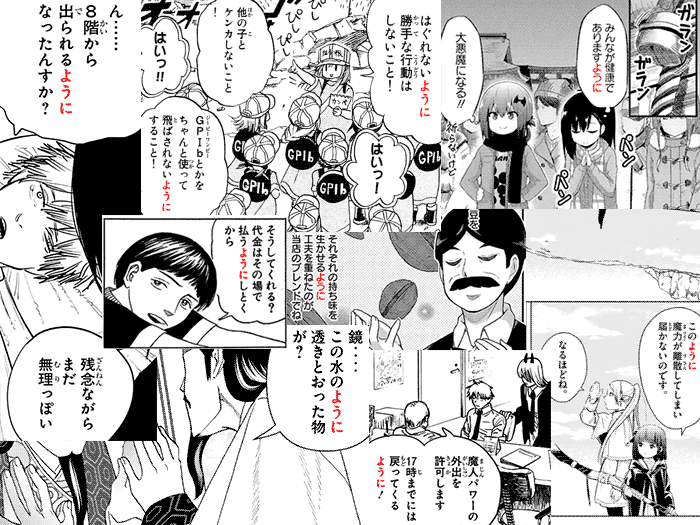

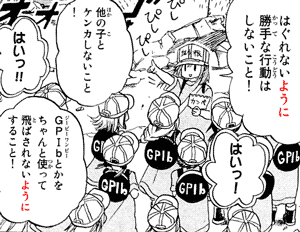
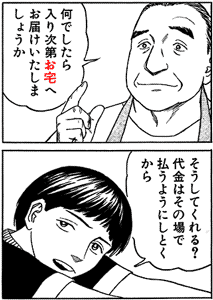
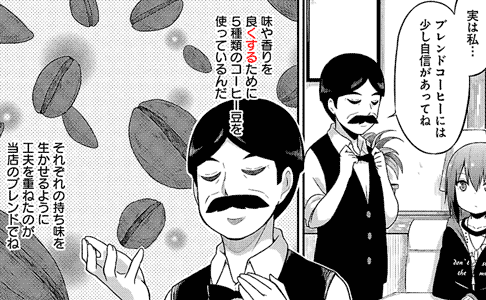
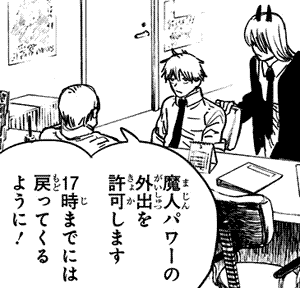
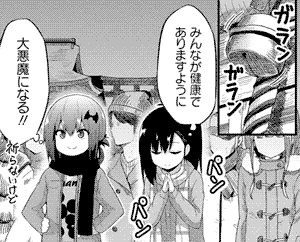
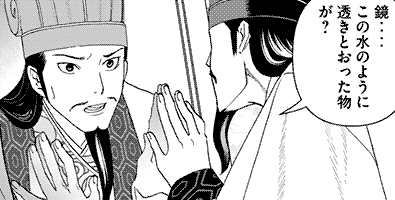
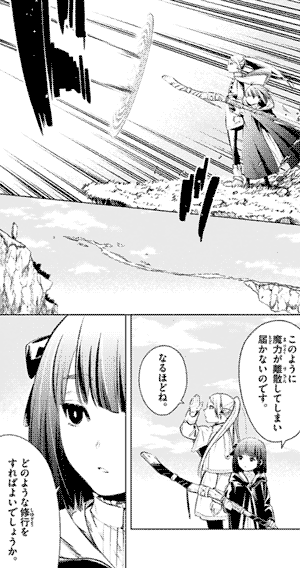
No comments: